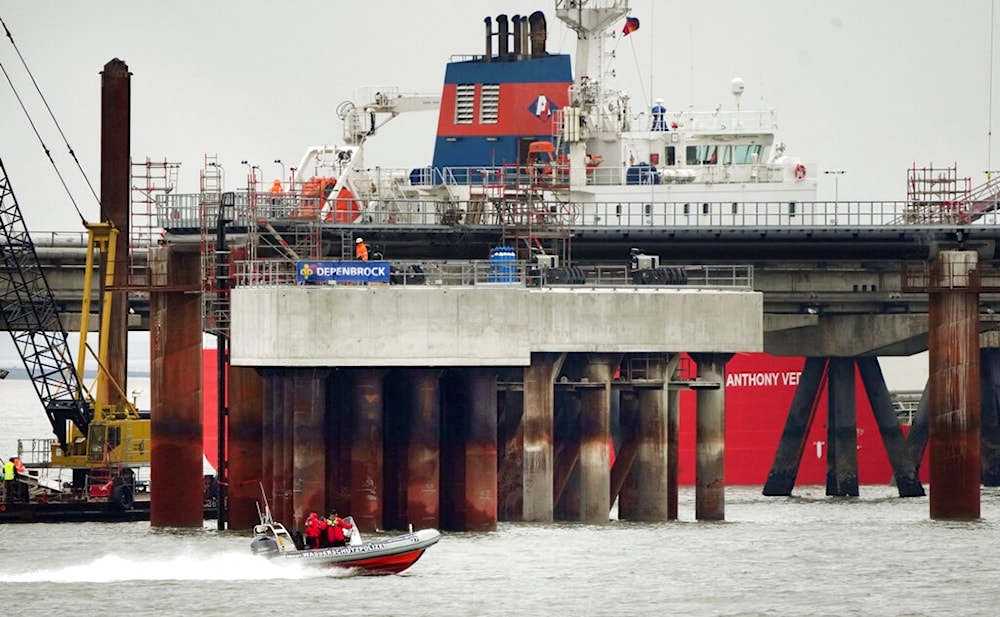Europe shifts to LNG as energy demands decrease by 20%
Europe has been forced to decrease its dependency on Russian energy consumption and shift to LNG and renewables.
-

A police boat drives past the construction site of the 'Uniper' LNG (Liquefied Natural Gas) terminal in Wilhelmshaven, Germany, Tuesday, November 15, 2022. (AP)
Since the Ukrainian-Russian war, Europe has cut down on 20% of its energy demand. However, this coming year will see a peak increase in liquefied natural gas (LNG) as the continent shifts towards renewable energy and efficiency gains, a new study said on Wednesday.
The war has contributed to a major shift away from Russian exports of gas, which triggered an increase in LNG prices that have rapidly turned into a major competitor among energy products. As non-Russian supply terminals are very limited, especially following the bombing of the Nord Stream 2 pipeline, Europe was also forced to decrease its dependency on energy consumption without jeopardizing heating plans over the winters that passed.
According to the Institute for Energy Economics and Financial Analysis (IEEFA), Germany, Italy, and Britain are all the main drivers for the hefty decline in energy demand, which was attributed to four factors: energy efficiency, demand management measures, the impact of high prices on demand, and mild winter temperatures.
"Europe has successfully navigated the energy crisis and has set itself up to continue curbing gas use, thanks in part to efficiency measures and renewables deployment," the IEEFA said. Renewables include wind and solar power, which could further drive LNG prices and demand up.
As a result, LNG terminals for export have been a vital project European countries have undertaken, despite the continuous price increase. By 2030, 13 terminals should be fully operational, compared to eight in February 2022. However, this risks an increase in demand three times over the available supply, driving price increases and spiraling the supply-demand whirlwind.
Read more: Global LNG demand to surge 50%: Shell
Germany's demand for Russian LNG
Although the determining factor for deviation from energy was the sanctioning of Russian supplies, Russian LNG exports to Europe particularly increased over the past three years.
German non-profit environmental and human rights organization Urgewald revealed Tuesday that Germany was still purchasing Russian gas via the Netherlands and Belgium. The latter has acquired gas from Russia in LNG form.
"Urgewald publishes a brief overview of gas suppliers to Germany, which, among other things, demonstrates the ongoing relationship with Russia," the organization said in a statement.
According to data, Germany is acquiring Russian natural gas after regasifying LNG that arrives from Russia to the Netherlands and Belgium.
The NGO called on the German government to cease purchasing Russian gas permanently and to initiate a gradual phase-out of natural gas by 2035.
This occurs against the backdrop of EU sanctions on Russia, prompted by Moscow's launch of a special military operation in Ukraine following years of provocations by the West.
US emerges as top LNG exporter
Shell's LNG Outlook 2024 report also revealed that the US became the largest exporter of LNG in 2023.
According to the report, in 2023 alone, the US exported 86 million tons of LNG, followed by Australia and Qatar, both of which have exported around 80 million tonnes.
Russia, on the other hand, exported over 30 million of LNG, followed by Malaysia.
The report further predicts a significant increase in global demand for LNG, expecting it to grow by more than 50% to reach 625-685 million tonnes annually by 2040. This surge is driven by two key factors, namely China's industrial sector shifting from coal to gas for cleaner energy, and the growing reliance on LNG in South and Southeast Asian nations to fuel their economic development.
Global LNG trade reached up to 404 million tonnes in 2023, despite tight supply pushing prices beyond historical norms. Milder winters, ample gas storage, increased nuclear power, and China's economic recovery offered relief, tempering gas prices in key import regions like Europe and East Asia, the report notes.

 4 Min Read
4 Min Read











